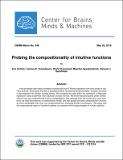| dc.contributor.author | Schulz, Eric | |
| dc.contributor.author | Tenenbaum, Joshua B. | |
| dc.contributor.author | Duvenaud, David | |
| dc.contributor.author | Speekenbrink, Maarten | |
| dc.contributor.author | Gershman, Samuel J. | |
| dc.date.accessioned | 2016-05-27T19:26:00Z | |
| dc.date.available | 2016-05-27T19:26:00Z | |
| dc.date.issued | 2016-05-26 | |
| dc.identifier.uri | http://hdl.handle.net/1721.1/102698 | |
| dc.description.abstract | How do people learn about complex functional structure? Taking inspiration from other areas of cognitive science, we propose that this is accomplished by harnessing compositionality: complex structure is decomposed into simpler building blocks. We formalize this idea within the framework of Bayesian regression using a grammar over Gaussian process kernels. We show that participants prefer compositional over non-compositional function extrapolations, that samples from the human prior over functions are best described by a compositional model, and that people perceive compositional functions as more predictable than their non-compositional but otherwise similar counterparts. We argue that the compositional nature of intuitive functions is consistent with broad principles of human cognition. | en_US |
| dc.description.sponsorship | This work was supported by the Center for Brains, Minds and Machines (CBMM), funded by NSF STC award CCF – 1231216. | en_US |
| dc.language.iso | en_US | en_US |
| dc.publisher | Center for Brains, Minds and Machines (CBMM) | en_US |
| dc.relation.ispartofseries | CBMM Memo Series;048 | |
| dc.rights | Attribution-NonCommercial-ShareAlike 3.0 United States | * |
| dc.rights.uri | http://creativecommons.org/licenses/by-nc-sa/3.0/us/ | * |
| dc.subject | cognitive science | en_US |
| dc.subject | Development of Intelligence | en_US |
| dc.subject | human cognition | en_US |
| dc.title | Probing the compositionality of intuitive functions | en_US |
| dc.type | Technical Report | en_US |
| dc.type | Working Paper | en_US |
| dc.type | Other | en_US |
